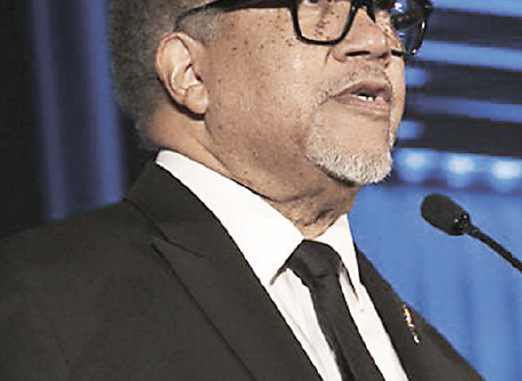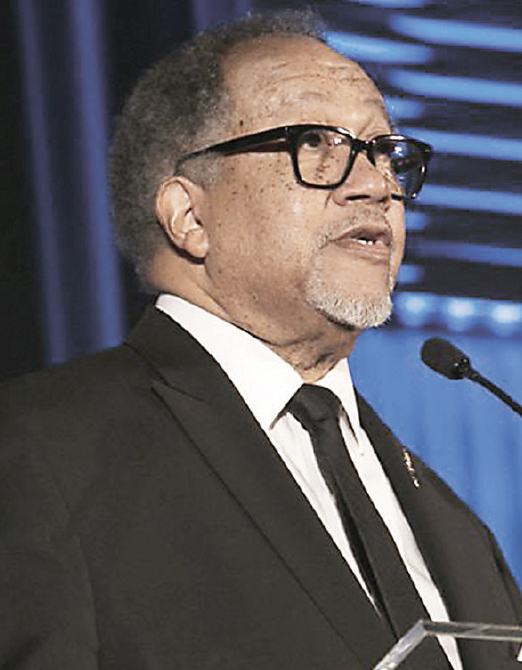
By Stacy M. Brown,
NNPA Newswire Correspondent,


If Wilmington, North Carolina can have a healing, maybe America can have a healing, asserted National Newspaper Publishers Association president and CEO Benjamin F. Chavis Jr., during a keynote address observing the 1898 Wilmington massacre.
November 10 marked 123 years since the evil and racist attack by white supremacists on African Americans. Then, hundreds of innocent people were killed in the only coup d’état ever to occur on American soil.
Wilmington leaders held ten days of events to commemorate, culminating in the Commemoration Unity Service held at Macedonia Missionary Baptist Church in the port city.
“Wilmington, North Carolina should be the emblem of the future if we learn from the past,” Chavis told the audience that included many members of the local and national media.
“To lean forward and heal forward and launch forward, we’ve got to talk about what should bring us together and not what should divide us,” Chavis insisted.
Rev. Jermaine Armour of the St. Luke AME Church, Deborah Maxwell, the New Hanover County NAACP president and Linda Thompson, chief diversity and equity officer of the city, also spoke during the more than 90-minute ceremony.
Bertha Todd, the 92-year-old “Mother of the 1898 Movement,” also spoke.“This was a wound that needed to be healed after 100 years,” Todd declared.
Armour and Maxwell each spoke of how the events of 123 years ago “shook the whole nation.”
Each emphasized the event’s theme, “Never Forgetting – Always Forgiving – Healing Forward.”
“What happened here 123 years ago had never happened before in America,” Chavis stated. “It was attempted again on January 6 of this year, but it didn’t happen,” he said about the attack on the U.S. Capitol by supporters of the then outgoing President Donald Trump, who wanted to overturn his election loss to Joe Biden.
Chavis admitted to the audience that when he arrived in Wilmington in February 1971, he had only heard details of what happened on November 10, 1898. He remarked that he didn’t know just how deep the wounds were.
“When I crossed that bridge, and as I was coming across the river, I didn’t know about all the bones of our people who are still in that river right now,” Chavis reflected. “When I heard the theme ‘healing forward,’ I said if Wilmington, North Carolina can have a healing, maybe America can have a healing,” he continued.
The Black Press of America leader recalled that the old The Daily Record newspaper building was the first building destroyed in the attack on Wilmington.
Reportedly, a mob of about 400 white people led by politicians had given the newspaper’s editor an ultimatum. They demanded that he destroy the newspaper and leave town. Before the day ended, The Daily Record had burned and the local government that won the election two days earlier had been overthrown and replaced by white supremacists.
“I’m so proud of our 230 African-American-owned newspapers, and one of our foremost historic newspapers is the Wilmington Journal,” Chavis reminded the audience, which repeatedly burst into standing ovations.
He noted that the current publisher, Mary Alice Jervay Thatch, has taken ill and rests in a local hospital.
“Pray for her,” he encouraged. “Pray that we keep that newspaper alive and don’t let it go down. There’s a relationship between the Journal and The Daily Record, and I’m so glad to see the family of Alex Manley, the heroic publisher of The Daily Record, in attendance.
“The people of oppression and racism wanted to make sure that The Daily Record didn’t print any more words or print anything to inform the people of what was going on. You would have thought people would have rushed to Wilmington to celebrate Wilmington rather than rush to Wilmington to overthrow Wilmington.”
Finally, Chavis applauded Wilmington police under its new chief Donny Williams.“I was so proud today when I got to that airport and saw all of these police officers. Lord knows that I’d rather be escorted by the police than chased by the police,” Chavis exclaimed. “It was a great feeling and then to see a black police chief in Wilmington, North Carolina. He’s a native of the city, and his family has deep roots in the city.”
Chavis met with Chief Williams in a private session before the event. The chief presented Chavis with a 1971 mugshot of the civil rights activist when the Dr. King disciple was jailed for not having his vehicle registration in his car’s glove box.
“The registration was in the trunk, but I was still locked up for several days,” Chavis said. “The chief said, ‘you may want to have this.’ I had been trying to get my mugshot for 50 years. I work for the Black Press. Words matter and pictures matter,” he concluded.

Be the first to comment